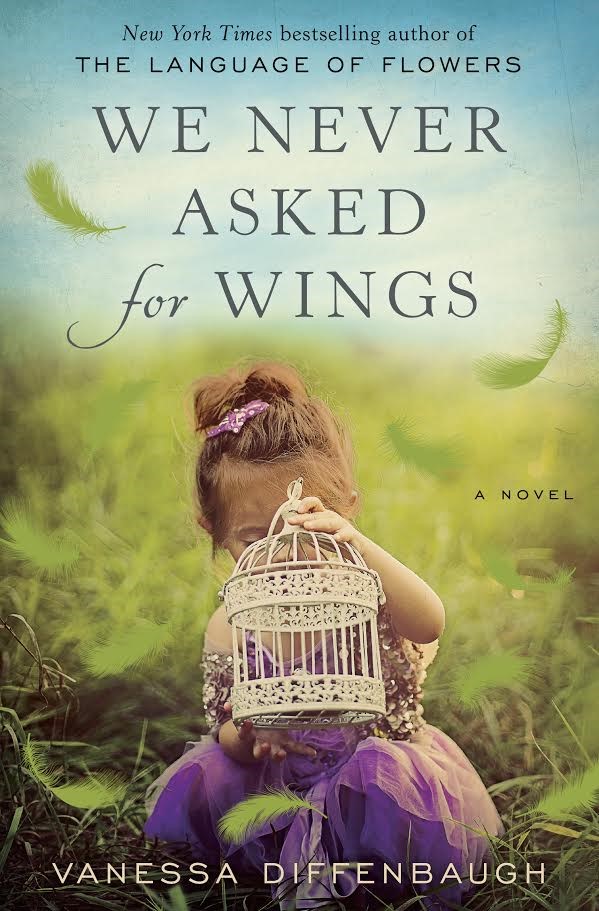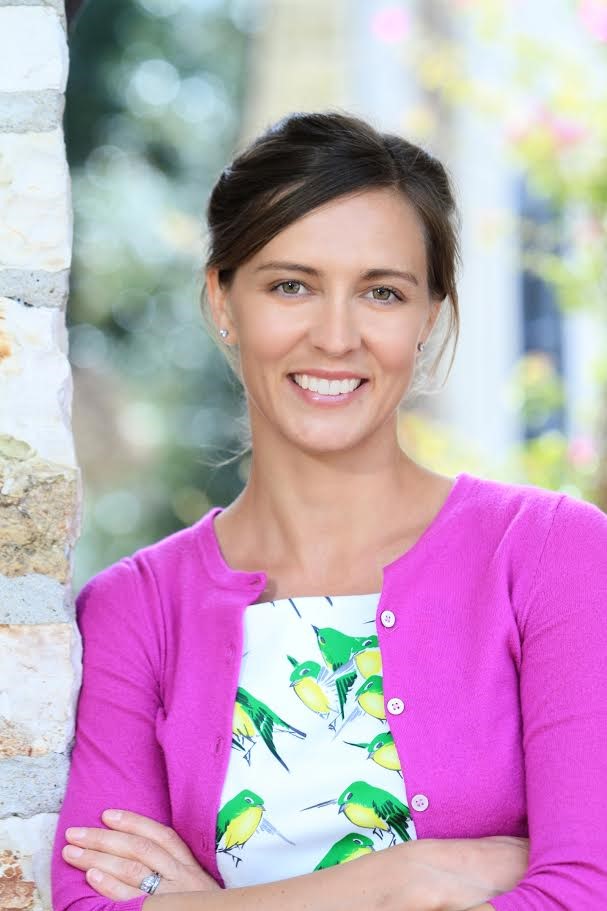
It’s such an honor to share my Sundays With Writers space with Vanessa Diffenbaugh this week. Way back in 2011, I wrote a review on her first book, The Language of Flowers and when I saw that her second book, We Never Asked for Wings, was out, I could not dive into it fast enough after enjoying her debut novel so very much.
What you might not know about Vanessa though is about the incredible organization she started for foster children and the impact she is having on raising another generation of gifted writers. What a gift to share more about this incredible writer AND incredible giver…two things I have a soft spot in my heart for!

Today Vanessa is here to share about her book, We Never Asked for Wings. In this story we learn that for fourteen years, Letty Espinosa has worked three jobs around San Francisco to make ends meet while her mother raised her children—Alex, now fifteen, and Luna, six. But now Letty’s parents are returning to Mexico, and Letty must step up and become a mother for the first time in her life.
Navigating this new terrain is challenging for Letty, especially as Luna desperately misses her grandparents and Alex, who is falling in love with a classmate, is unwilling to give his mother a chance. Letty comes up with a plan to help the family escape the dangerous neighborhood and heartbreaking injustice that have marked their lives, but one wrong move could jeopardize everything she’s worked for and her family’s fragile hopes for the future.
This book is beautiful and it reminded me a lot of, The Same Sky (you can read our interview on that one here!) as it tackles the issue of illegal immigration and two sweet kids neglected by their alcoholic mother, struggling with poverty and placement in society. I would recommend this one for fans of The Book of Unknown Americans (you can read that interview as well, here). To read my full review, check out this must-read list!
Now grab your coffee and settle in with this incredible writer today!

Illegal immigration seems to be a theme in so many of the books that I have read this year (The Same Sky, Americanah, & The Book of Unknown Americans– to name a few). Why do you think so many authors are exploring the topic of illegal immigration and what was the most surprising thing you learned about this issue when writing your book, We Never Asked for Wings?
This is a great question. For me, it is especially interesting that I wrote a book about immigration because I had no intention of doing so! I was thinking about economic and educational inequality, and themes of motherhood and family. But as I got deeper and deeper into this novel, it struck me that I had created a community of characters in which immigration status would be an issue. It would be disingenuous to write about a low-income community in California and pretend that every citizen in the book would be documented. That simply isn’t the case, and it has profound implications for the people who live in these communities. So, to answer your question, I think so many writers are writing about immigration because so many people are living it, and for those of us who are trying to capture this moment in time, undocumented immigration is an issue we can’t ignore.
In your first book you had to learn so much about horticulture, but in this book it was all about the feathers (from the science of them to utilizing them in an interesting art medium). How did you come up with this idea for your story and how did you gather your research to learn more about birds and feathers to shape this theme? Were there any books or documentaries that helped you as you put together this research?
Five days after we were married, my husband and I moved to Guanajuato, Mexico, to learn Spanish and volunteer, work, and travel. We lived there for a year, and one of our favorite things to do on weekends was to open up a big book we had purchased on Mexican Folk Art, find a work of art we especially liked, and travel by bus to the small village where the artist lived in an attempt to meet him or her. This is how we got acquainted with the Olay Olay family in Michoacan—we arrived by bus and were directed to their house, where a dead bird greeted us on the stoop. Senor Olay Olay, a fourth generation feather worker, told us that if a bird died anywhere in Michoacan it always found its way to their door—a line that made its way directly into my book. To this day, that visit remains one of my best memories of our time in Mexico.
When I came up with the idea of the abandoned housing project I kept asking myself—but why would the Espinosa family stay? Why would they stay, even when everyone they knew had already left? It was this question that led me to create the character of Enrique, a Mexican feather worker. He stayed for the birds. I imagined him at the window, sitting underneath the Pacific Flyway; I imagined his vast and intricately organized feather collection. It was great fun to research the birds of the bay, and when I needed an idea for Alex’s science project based on his grandfather’s feather collection, I called my brother-in-law, Noah Diffenbaugh, who is a climate scientist at Stanford. We spent hours talking about all the things Alex could learn from the feathers, and with his guidance I was able to come up with a project idea and describe the science behind it.
The Language of Flowers was such an enormous hit and has been one of my favorite debut novels in the past few years. When your first book gets such wild praise and accolades, how hard is it as a writer to follow that up with a second novel? Do you feel it created additional pressure for you?
It was very, very hard! So hard that when I open my new book, my favorite page is the one at the very beginning that says: The Language of Flowers, and under that, We Never Asked for Wings. I have two titles to my name! There are so many phenomenal writers that haven’t produced a second book after a first success, and I can completely understand why. You have all the reviewers in your head, reminding you of all the things you did wrong, and you have all your readers in your head, reminding you of all the things you did right, and sometimes they are the very same things! It is easy to lose your own voice. About three years into the book, when I’d completed (another) terrible draft and was losing hope, a smart writer friend of mine gave me fantastic advice. She told me to imagine what it feels like to open up the latest book of my favorite writer (I imagined Toni Morrison) and she told me to think about that sense of the familiar you get when you are reading the words of an author you love. Then she said “What is the next Vanessa Diffenbaugh book like?” When she asked me that, I knew exactly what she meant, and I also knew that I hadn’t written it. So I started over, again, but this time I remembered my voice.
In the opening of the book, Letty abandons her children to take her parents across the border. We also read of many instances where Letty really struggles as an alcoholic, even risking her son’s life at one point in the story. Do you think Letty deserved to work through all of this with her kids or do you think Letty is a good example of a mom that would have benefitted from having a foster mom come in to help with her children until she got back on her feet?
Letty is a good example of someone who needs support. Far too often, parents lose their children to the foster care system when what they really need is help to become the parent they want to be to their children. There are extreme cases in which the child must be removed for their own safety, but we know that more often children and parents do better when they are kept together and given the support they need to thrive. Youth Villages, a national non-profit, is a leader in the effort to reform foster care and increase positive outcomes for kids. They are perhaps best known for their Intercept® intensive in-home program, a program that revolutionizes foster care by helping children avoid it altogether. Youth Villages is respected not only for their programs but also for their research and policy–they have a decades-long dedication to outcomes measurement that has resulted in national recognition. I am thrilled that the small non-profit I co-founded, Camellia Network, has recently been acquired by Youth Villages, and we will be working together to grow a national movement around supporting youth aging out of foster care. You can become part of the new network at www.lifesetnetwork.org.
As a former teacher to youth in low-income communities and the founder of the former Camellia Network, were you able to use these experiences working with struggling youth to channel them into the children in your story?
It’s funny, with The Language of Flowers, interviewers often asked, or even just assumed, that Victoria was based on the children I fostered. She wasn’t! In fact, her personality was as different from my sons’ as possible. But in We Never Asked for Wings, I drew a lot of inspiration for Alex from my sons. Both Tre’von and Donovan are incredibly smart, responsible and resilient, and Tre’von, like Alex, liked to read the encyclopedia and recite random facts to his friends and teachers. I interviewed him a few different times about what it felt like to be a smart kid who loved to learn in a school that didn’t expect anything from him.
You have been working on a really special project leading a Young Authors Club, assisting 40 young authors to help them write their own books. What has your experience been like leading such a large group of young authors and what advice would you give to other authors to do the same in their own communities?
I didn’t mean for the group to be so big—who would have thought that so many kids, after six hours of sitting still and working hard, would want to stay after school to WRITE? Well, it turns out that many do. I had a great time teaching these eager young people everything I know—we started by doing close readings of some of my favorite children’s books, and then we spent a week writing spectacular first sentences, and then we moved on to first chapters. The kids wrote some amazing books, including titles like “Surviving Middle School with Violet Woods” and “The Teddy Bear Detective Agency.” In terms of advice, I would look at Dave Egger’s nonprofit, 826 Valencia (or 826 National). He and his wonderful staff have been teaching writing for almost 15 years and run great programs.
As busy moms, I often hear that moms feel like they don’t have the time to take on volunteer opportunities. You are a perfect example of a mom that really does an excellent job doing both. What advice would you give to moms who want to do more to help their community, but feel limited with their time?
I have to be honest here and say that I have a phenomenal full-time assistant, and I couldn’t do half of what I do without her. I say this because I think we often expect ourselves as women and mothers to be superhuman—to care for kids around the clock, to support our husbands and have immaculately clean homes and still somehow have successful careers and volunteer endless hours in our communities. It just isn’t possible, and too many of us spend too much of our time feeling guilty about not doing one (or more) of these things well enough. When I sold my first book, I decided to hire an assistant so that I could spend all my time with my kids or writing my books or volunteering in the community—not booking travel or managing my schedule or picking up dry cleaning or all the other billions of little things that are involved in managing a household and career. I will say, though, that even before I was in the financial position to hire an assistant, I was always good at prioritizing. When I wrote The Language of Flowers I was a stay-at-home mother of four, and I would often call my mother and announce that I had just gotten both babies down for their nap and I was kicking the piles of dirty laundry out of the way so that I could open my office door and start writing. You just can’t do it all!
If you could tell anyone to read one book (other than your own) what would that book be (we will add it to our list of recommended reads for our readers!)?
Just Mercy, by Bryan Stevenson. It is an incredibly intense book about racial inequality in our criminal justice system, but it is beautifully written and powerful, with just enough hopefulness to help you sit with the discomfort of the truth and think hard about how you can help contribute to a solution. I recommend it to everyone I know.
You can connect with Vanessa Diffenbaugh on GoodReads, on Facebook, or through her website! I’m always thankful for these moments with writers and I hope you will pick up this amazing book! You can always connect with me on GoodReads,through our books section of our site, and you can read our entire Sundays With Writers series for more author profiles. Happy reading, friends!
*This post contains affiliate links!
Pin It